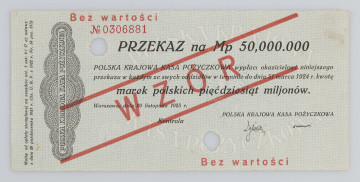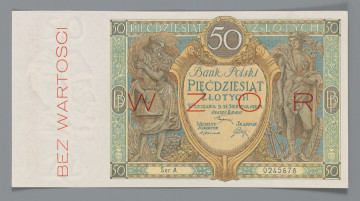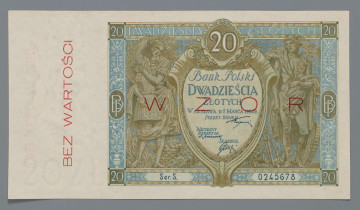
Cheque for 50,000,000 Polish marks - a template
1923
National Museum in Lublin
Part of the collection: Paper money during the Second Polish Republic
The issuance of PLN banknotes in the Second Republic was for a long time closely related to the currency reform initiated on 28 April 1924 by Władysław Grabski's government. The scale of the economic problems and the weakness of the government's political base did not allow for adequate preparation of corrective measures. One of the fundamental problems was the shortage of perfunctory money – both coins and low-denomination banknotes. The remedy was the introduction into circulation of perfunctory tickets serving as substitute money, issued by the State Treasury. Initially, three solutions were used to meet market needs. Firstly, one- and two-zloty banknotes printed in 1919, and only now introduced into circulation, were used. Secondly, the halves of the withdrawn 500,000- and 10,000,000-MP notes were replaced by one- and five-grosz coins appropriately stamped. Also, specially designed pass tickets in the denominations of 10, 20 and 50 groszy were printed. Despite the gradual withdrawal of the aforementioned replacement money from circulation, new ones were put into circulation in 1925 and 1926. This gave rise to very unfavourable phenomena. One of them was the so-called minor inflation, also referred to as coin inflation. It resulted from the fact that perfunctory issues were very numerous and initially equalled bank issues, and at the end of 1925 even exceeded them. This led to a second unfavourable phenomenon. This was a kind of monetary dualism, made all the more noticeable by the fact that scratch off tickets were sometimes treated as an inferior type of money, and were often worth less than banknotes of the same denomination. The remedy was the introduction of new banknotes and the simultaneous withdrawal of replacement money. A manifestation of this phenomenon was the issue of the ten-zloty banknotes on 20 July 1926. They were designed by Zdzisław Eichler. They were first printed in the State Graphic Works, and later in the Polish Security Printing Works. They were circulated on 25 June 1927 and remained in circulation until 31 December 1932. The withdrawn 10-zloty banknotes were put back into circulation five days before the outbreak of the World War II. The occupational authorities withdrew them finally on 7 May 1940.
Leszek Poniewozik
Author / creator
Dimensions
cały obiekt: height: 161 mm, width: 80 mm
Object type
paper money
Technique
Material
paper
Creation time / dating
Creation / finding place
Owner
The National Museum in Lublin
Identification number
Location / status

1923
National Museum in Lublin

1925
National Museum in Lublin

1926
National Museum in Lublin
DISCOVER this TOPIC
Museum of King Jan III's Palace at Wilanów
DISCOVER this PATH
Educational path